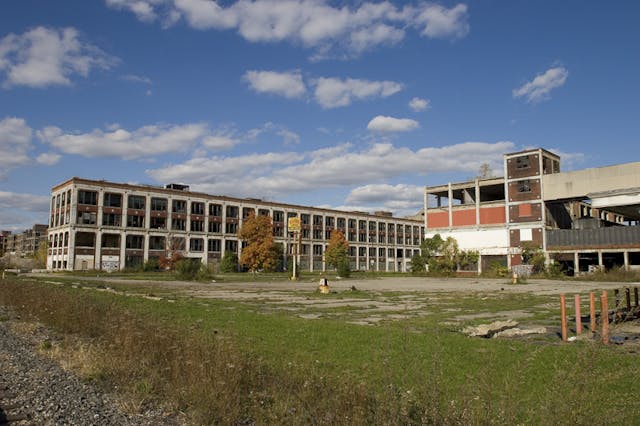Packard Plant redevelopment plans change, less cultural and more industrial
The infamous Packard Plant in Detroit has had momentum recently with a new owner, Fernando Palazuelo, beginning work to clear debris from the long-abandoned automotive factory in order to start his redevelopment plan. Initially, Palazuelo broke ground in 2017 with the promise of a mix between industrial-style office and workspace alongside more luxurious appointments, such as a spa, hostel, and even a dedicated “techno club” inside the century-old compound. But with some buildings on the facility deteriorating structurally, including the revered bridge over East Grand Boulevard which collapsed in January 2019. Since then, the City of Detroit and Palazuelo have demolished the more unstable buildings, with Larry Emmons, senior managing director for Newmark commercial realty (which manages the site’s leasing) telling the Detroit Free Press that the buildings on their portions of the Packard property will be replaced by “a modern, 21st-Century industrial building.”
Instead of catering to a more cultural experience, Palazuelo and Newmark are now focusing on industrial tenants, with the recently cleaned out and renovated sections of the plant being offered “build to suit” for new tenants, meaning that they can make requests to have custom floor plans and access to various utilities tailored to their needs. “My job is only to find industrial tenants,” Emmons explained to The Detroit News last Thursday. “We’re not trying to do redevelopment of existing buildings for multi-family units or multi-use.”

While maybe not as ambitious as before, it will more importantly be presumably more attainable to cater to industrial uses as the spaces will not have to be built out as comprehensively as they would need to be for restaurants and clubs, all of which have immense overhead and challenges that the renovated Packard Plant would need to feed in order to support those operations. Additionally, new-built industrial spaces are in demand not just for Detroiters to have a fresh space for their businesses and workspaces, but also in the construction jobs generated in order to develop these spaces, according to The Detroit News.

While much has been said about Palazuela, the Peruvian investor who bought 20 acres of the plant from the City of Detroit for $405,000 in the back taxes that foreclosed the building, little is ever mentioned about the Packard Plant’s long-time chaperone, Dominic Cristini. He recently passed away last June from cancer at the age of 61—a rather unexpected end when you consider he was the man who once held an armed stand-off with Detroit law enforcement in a long-fought dispute over rights to the property.
Cristini essentially bought the rights to the property from the defunct Biogenesis company in 1998, which had filed for Chapter 11 the year before, for just $3000. A few months later, however, the Detroit City Council voted to evict the shell of Biogenesis, which Christini had purchased in order to secure the land, and take control of the property by simply sending over its friendly neighborhood gang unit. The initial stand off, as documented by a Detroit News reporter who was with Christini during the event, eventually relented from his office door, but the police staked out the plant by commandeering the guard shack and patrolling the building 24/7, even building a wall around his office with no explanation. Over the years, the City and Christini fell into a diehard legal dispute, with the Michigan supreme court ultimately siding with Christini and rejecting the City’s claim to the land, but it was no matter. Strapped for cash and desperate, Christini had begun selling drugs; he was busted for moving ecstasy and served four years in prison and ultimately fell behind on the taxes—the taxes that Palazuela paid to relinquish the City’s foreclosure and take ownership. “I own up to it,” Christini told The Detroit News back in 2019. “I’m not going to cry about it; I got caught and did my time.”
While the future of the monolithic Packard Plant is still far off on the horizon, the refocus by Palazuela and Newmark should help the plant’s old bones fill with life sooner, working towards an investment into the future of Detroit industry with the new structures rising above the decay and demolition.


